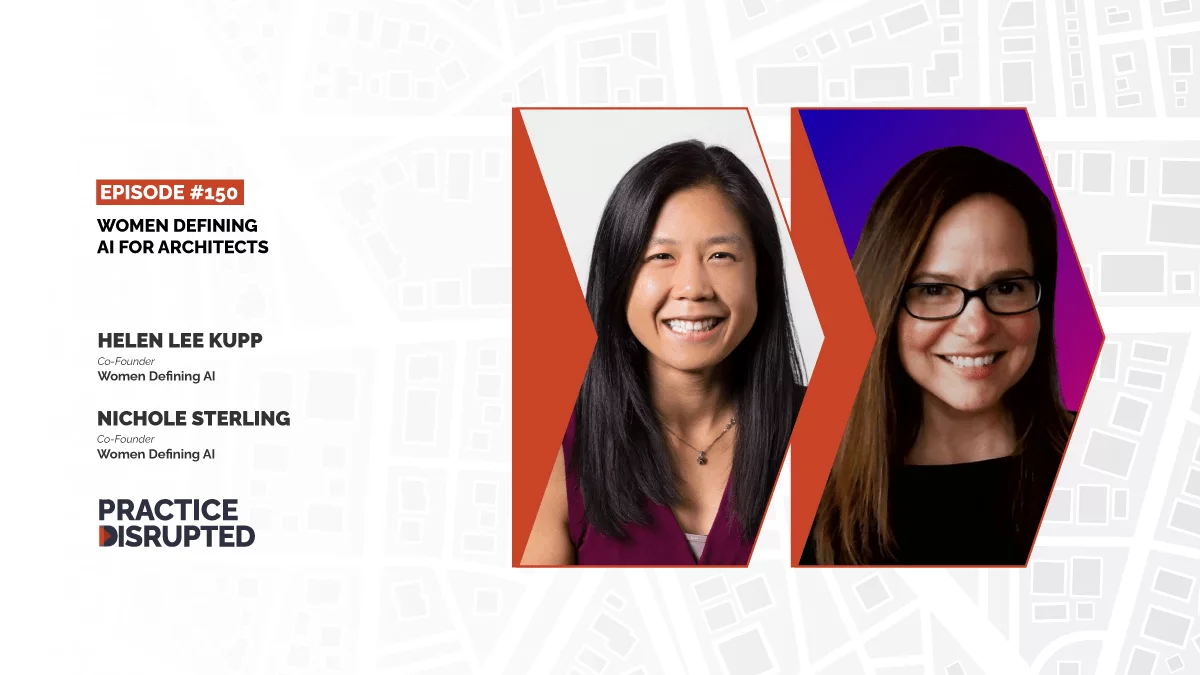How can we bridge the gender technology gap and ensure ethical development of AI while empowering women and non-binary individuals in STEAM fields?
On this episode of Practice Disrupted, Evelyn welcomes Helen Lee Kupp and Nichole Sterling, the co-founders of the Women Defining AI community, to the show. Helen and Nichole are dedicated to bridging the gender technology gap and advocating for ethical AI development by merging their tech expertise. They are on a mission to empower women and reshape the narrative around AI to promote an inclusive technological future.
First, we dive into the beginning of Women Defining AI, which sprouted from their shared passion for accessible AI knowledge. They highlight how their work extends beyond online platforms through a successful in-person event emphasizing the importance of fostering community. Helen and Nichole explore the gender tech gap, especially in STEAM industries, and why women need to be involved in the development of AI. They discuss the importance of understanding the language of AI for the workplace and in daily life and experimenting with its applications.
Then, they share tips for optimizing AI models, like asking follow-up questions and training them to perform exactly how you want. They also touch on data privacy concerns behind AI, regulatory protocols, the emergence of new job roles in the future of the AI era, and how to leverage human jobs with AI jobs.
It’s important that women stay close to AI. When following the developments, we’re starting to see different behaviors from workplaces. More workplaces are looking for AI fluency and AI skills. So, there’s already a gender gap, right? Just from a STEM perspective. But if now workforces are and workplaces are looking for AI fluency and their skill sets, women are just going to continue to fall behind. – Nichole Sterling
To wrap up the conversation, Helen and Nichole share their perspective on the often hostile mindset architects have surrounding AI and the undeniable fundamental changes AI has on the industry paradigm. They also emphasize the importance of learning and absorbing the model despite initial resistance.
Tune in next week for a special panel discussion on the Built Environment Futures Council and the integration of artificial intelligence into architecture and construction.
Guests:
Helen Lee Kupp
Helen Lee Kupp is the co-founder and creator of Women Defining AI, a community of female leaders tackling the biggest topics of understanding today’s generative AI widespread adoption through experimentation, support, and community learning. She takes a practical approach towards helping leaders navigate the biggest changes in work — both from AI/technology, and the flexible/hybrid work revolution. She is the co-author of WSJ Bestselling book “How The Future Works: Leading Flexible Teams to Do the Best Work of Their Lives”. She believes in closing the gender technology gap – starting with women at work – to create a future of work that looks and feels fundamentally different for her two kids and the women she mentors. We can & should do better.
Nichole Sterling
Nichole Sterling, co-founder of Women Defining AI, has always been a utility leader blending strategy, marketing, HR, and finance in tech industries. Her impact on company success ranges from returning $4M YOY to field operations teams through corporate learning initiatives, increasing sales pipeline activities by 10 – 30x by establishing a RevOps philosophy, and even driving innovation within local municipal government. Nichole’s current focus is on developing AI technologies, leading a stealth company specializing in digital twins and AI agents. A fervent advocate for women in tech, Nichole combines her passion for AI with a commitment to ethical and inclusive technology. Beyond her professional pursuits, Nichole loves growing her vertical gardens, avoiding the moose in her backyard, and hanging out with her three boys and husband.
📍 Show Links:
Connect with Helen on LinkedIn
Connect with Nichole on LinkedIn
Women Defining AI
📚Continue Learning:
Women Defining AI community perspective papers
Community classes
Memberships


![[194] Architecture, And: Bridging Design and Industry with Nima Balasubramanian](https://practiceofarchitece2ac4.zapwp.com/q:i/r:0/wp:1/w:1/u:https://i0.wp.com/practiceofarchitecture.com/wp-content/uploads/2025/05/1200x675_PoA_Episode194.jpg)
![[193] Architecture, And: Rochelle Mills, Shaping Community Stories](https://practiceofarchitece2ac4.zapwp.com/q:i/r:0/wp:1/w:1/u:https://i0.wp.com/practiceofarchitecture.com/wp-content/uploads/2025/05/1200x675_PoA_Episode193.jpg)
![[192] Architecture Needs Radical Transparency](https://practiceofarchitece2ac4.zapwp.com/q:i/r:0/wp:1/w:1/u:https://i0.wp.com/practiceofarchitecture.com/wp-content/uploads/2025/04/1200x675_PoA_Episode192.jpg)
![[191] Architect, And: Clarence Kwan Architect turned Lifestyle Concierge](https://practiceofarchitece2ac4.zapwp.com/q:i/r:0/wp:1/w:1/u:https://i0.wp.com/practiceofarchitecture.com/wp-content/uploads/2025/04/1200x675_PoA_Episode191.jpg)
![[190] Running a Regenerative Business Practice](https://practiceofarchitece2ac4.zapwp.com/q:i/r:0/wp:1/w:1/u:https://i0.wp.com/practiceofarchitecture.com/wp-content/uploads/2025/04/1200x675_PoA_Episode190.jpg)
![[189] Architecture, And: Rico Quirindongo, Public Servant](https://practiceofarchitece2ac4.zapwp.com/q:i/r:0/wp:1/w:1/u:https://i0.wp.com/practiceofarchitecture.com/wp-content/uploads/2025/04/1200x675_PoA_Episode189.jpg)
![[188] Amplifying Women’s Stories in Architecture with Jadyn Anderson](https://practiceofarchitece2ac4.zapwp.com/q:i/r:0/wp:1/w:1/u:https://i0.wp.com/practiceofarchitecture.com/wp-content/uploads/2025/03/1200x675_PoA_Episode188.jpg)
![[187] Architecture, And: A New Language for Material Decision-Making](https://practiceofarchitece2ac4.zapwp.com/q:i/r:0/wp:1/w:1/u:https://i0.wp.com/practiceofarchitecture.com/wp-content/uploads/2025/03/1200x675_PoA_Episode187.jpg)
![[186] CannonDesign’s Billie, An AI Companion Transforming Architectural Workflows](https://practiceofarchitece2ac4.zapwp.com/q:i/r:0/wp:1/w:1/u:https://i0.wp.com/practiceofarchitecture.com/wp-content/uploads/2025/03/1200x675_PoA_Episode186.png)
![[185] Architecture, And: Michael Ford on Hip Hop, Innovation, and Representation in Practice](https://practiceofarchitece2ac4.zapwp.com/q:i/r:0/wp:1/w:1/u:https://i0.wp.com/practiceofarchitecture.com/wp-content/uploads/2025/03/1200x675_PoA_Episode185.jpg)